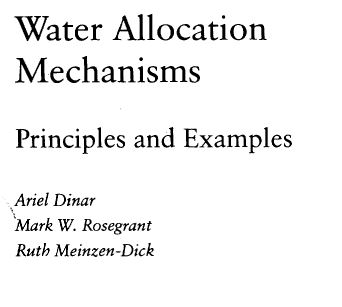Water Allocation Mechanism: Principle and Examples
From the earliest times, water resources have been the economic principles behind allocating scarce water allocated on the basis of social criteria - maintaining the resources, they review the actual means of various community by ensuring that water is available for human mechanisms used for allocating water, including marginal consumption, for sanitation, and for food production. cost pricing, social planning, user-based allocation, and Societies have invested capital in infrastructure to water markets. Giving examples from experience in maintain this allocation. several countries, they weigh the pros and cons of Yet social change, including changes in (and more different approaches to water allocation, showing that no understanding of) how goods are distributed, has single approach is suitable for all situations. produced new issues in water allocation. Population Clearly the state must play an important regulatory growth has made water scarcity a major problem in many role, for example, but how effectively it does so depends countries and water pollution, while by no means a on the relative political influence of various stakeholders recent problem, is more widespread than ever before. and segments of society. User-based allocation is Traditionally the state has played a dominant role in generally more flexible than state allocation, but managing water resources, but inefficient use of water, collective action is not equally effective everywhere; it is poor cost recovery for operating and maintenance most likely to emerge where there is strong demand for expenses, the mounting cost of developing new water water and a history of cooperation. The outcome of sources, and problems with the quality of service in market allocation depends on the economic value of agency-managed systems has led to a search for water for various uses, but moving toward tradable alternatives that make water allocation and management property rights in water may ease the process of more efficient. intersectoral reallocation by compensating the "losers" Dinar, Rosegrant, and Meinzen-l)ick address some of and creating incentives for efficient water use in all the basic principles of treating water as an economic sectors. good and of allocating it among sectors.
